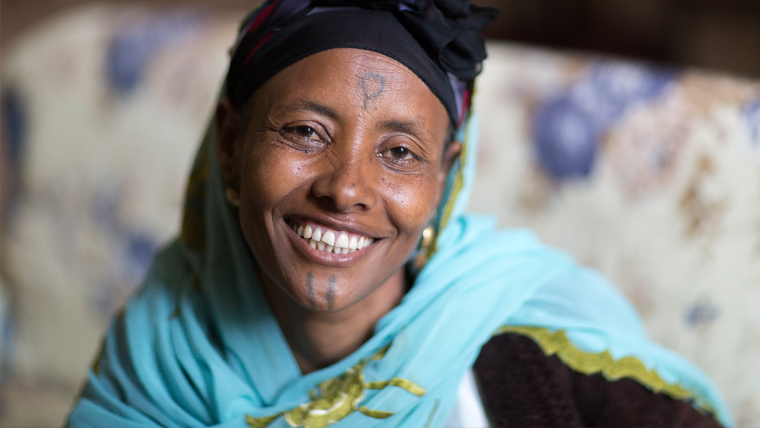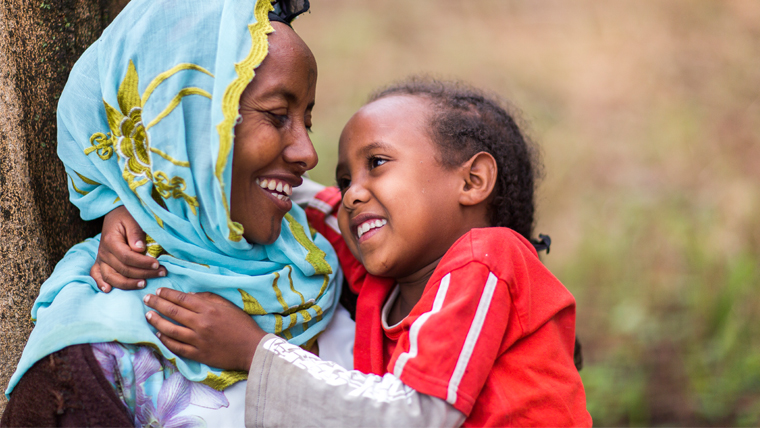Ethiopia, 1984: "We were all waiting for our deaths."
Ansha was just 10-years-old when the 1984 famine swept across her area. Now aged 40, she vividly describes her struggle to survive, her nightmares from her childhood and how World Vision has helped to transform her life to what it is today.

I remember the time of the famine - the sun flared, there were no trees. It was very difficult. It was so dusty that dirt blew around us in a whirlpool.
My brother, Ahmed, was so thin that he was like the size of my little finger. He was only two-years-old. It was very easy to count each and every bone in his body, and I would count along the bones in his ribs. We kept on asking ourselves, when will he die? It was difficult to even feed him because he struggled to open his mouth. His skin was loose, hanging off his body.
There were different types of feeding groups at the centre that we were arranged in. My brother was in the red group – the critical group - and I was in the other. I was scared to see him because I feared his death. It was only because he was my brother that I forced myself to visit - it was truly awful to see.
My mother gave birth at the camp. She woke me up as she went into labour and my baby sister was born healthy, but because my mother didn’t have any milk to feed her, three days later she died. My mother was being fed at one of the therapeutic feeding centres at the time and she was so weak she didn’t even have the strength to hold her - it was me who first hugged the baby. She wasn’t named and we didn’t do anything to celebrate the birth, because we had nothing at the time. We didn’t expect her to survive - or indeed any of us. We were all waiting for our deaths.
Our parents regretted giving birth to us. They said that they wished they’d never had us so that we didn’t have to experience this pain. My mother told us to have hope, because soon we would go to a better place. She said that we would soon meet each other [in heaven].
Two years later I still experienced fear. I’d seen so many people dying around me - even after my brother got better, I just couldn’t believe it. I expected to see him relive his past. It was frightening – every night it used to fill my dreams.
Finally free from fear
But now, because of World Vision’s work I no longer have fear in my life. I forgot the bad memories from the famine on my first day of school. From that day on, my education became my focus.
World Vision saved our lives with its work. They fed us, most children were supported with feeding, and when people were sick they were treated in the health clinics. When people were feeling better they received a sack of flour so that they could return home with something to eat.
Because of this I started to improve - we all did. Before, I couldn’t even walk, I’d sweat from being so weak. But then I was given food and I could see the changes in my appearance; my face became fuller; I began to feel stronger and stronger.
Once we got better we were all able to go home. Then World Vision began their development work - they grew seedlings, they created a nursery, people were employed to work, schools were constructed, health institutions created, water pipelines built - this was the transition from relief to development.
I see the famine as an opportunity. If it wasn’t for the drought World Vision wouldn’t have come to this area and we would never have seen this type of change or been introduced to these types of crops and technology.
Today things have changed drastically. It’s clear to see. World Vision introduced new plants that have changed the scenery to green; they’ve sponsored our children, which has provided support for vulnerable children to receive educational material; there’s new livestock for families and oxen to plough our lands - in summary, life has completely changed. We can see the difference.
I use the events of 1984 to counsel my children. For example, two of my kids are sponsored and I tell them that it is because of this drought that child sponsorship began here. It’s a good opportunity for me to teach them about this area’s history. Sometimes they see the challenges of my life and they want to drop out of school to help me, but I tell them that compared to my childhood, this is nothing. It will get better, so it’s important that they finish their education.
Today I have farmland. Although my husband has died, I grow sugarcane, grains, tomatoes, cabbage… I sell two trucks full of sugarcane each year. Even though I live in a rural area without electricity, I have solar power at home because of the help of World Vision. I don’t hate any kind of job, I’m happy to do everything. I have hope and I enjoy this life.

Ansha’s story shows the kind of success that your support brings. When you join the Grow Hope campaign, we’ll donate maize seeds to families in Zambia, where we are working to effect the very same changes that Ansha has seen throughout her life.